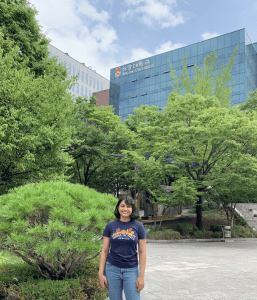Neha Cariappa, 2nd year graduate student in the MA in Asia Pacific Studies program, received a summer stipend from the USF Center for Asia Pacific Studies to attend Sogang University’s International Summer Program in Seoul.
Why were you interested in studying in South Korea?
For the past year, I have been doing research related to Korean society and culture—specifically sexism and feminism in South Korea. Interacting with South Koreans first hand is the most favorable situation for an aspiring researcher.
 What was your first impression of South Korea, and Sogang University?
What was your first impression of South Korea, and Sogang University?
Although it was my first time at Sogang, the atmosphere was really friendly. We got a tour of the beautiful campus and we were introduced to Korean students as part of the Buddy Program at Sogang. These students spoke English, and they made sure we got to experience various cultural and interesting places in Seoul. The best thing was the 24-hour convenience store right outside the dorm. It was perfect for unexpected food cravings! The area around Sogang, called Sinchon, was great for university students. It had trendy clothing stores and small restaurants, with just the right vibes and prices for students.
What was a typical day like while you were studying in Seoul?
We attended classes from 9am to 3:45pm, with an hour-long lunch break in between.
I really enjoyed my Korean Society class because the professor answered all our questions about Korean stereotypes and the fascinating trends and culture in Korea. I liked that we were encouraged to compare Korean society and culture to the kind of society each of us grew up in/live in. It was especially exciting to delve into more current social issues faced by young Koreans today including gender inequality, discrimination against the LGBTQ+ community, pseudo-religions, unemployment, and involvement in politics. This class really made me think more about what topics I find interesting about Korean society and culture.
Although I have watched quite a few Korean movies before, the Understanding Contemporary Korean Cinema class allowed me to analyze and think critically about South Korean cinema. The aim of this class was to learn more about Korean history and society through Korean films. We watched movies about the North-South Korea conflict, the “comfort women” issue, Japanese colonization of Korea, and a gendered perspective of Korea’s political scene.
What trips and activities did you participate in outside of Sogang with your program?
We had field trips every Friday. We visited the usual tourist sites in Seoul such as the Gwanghwamun, the Gyeongbokgung (Palace), and the National Museum of Contemporary Korean History. We also took a tour of the DMZ. The last weekend was the most fun—a 2 day, 1 night trip to the city of Jeonju, where we visited a traditional village and dressed in the traditional hanbok. Later in the day we made traditional Korean paper Hanji, and even learned how to make the dish known as Bibimbap. We attended the famous Boryeong Mud Festival the next day which was definitely a rejuvenating experience.
What observations can you share about South Korean society?
The younger generation is definitely more progressive in their thinking, compared to the older generation of Korea. I noticed a lot of young people with tattoos, which otherwise used to be a huge taboo and associated with “criminal behavior”. There are still many older people who think that way, but I noticed the change in perception among the youth.
Other than Seoul, we visited Jeonju. The people there looked surprised to find foreigners in their part of the city. It was probably because there aren’t many foreigners who would visit Jeonju, since Seoul or Busan are usually the more common choices.
How will you use what you’ve learned while studying abroad in Seoul in your future academic career?
Being able to live around Koreans and see an aspect of their lifestyle firsthand, even if for a short while, has given me a better perspective on Koreans. Making more Korean friends has helped me increase my pool of contacts and has improved my access to conducting surveys and interviewing Koreans for my research. Most importantly, being taught by Korean professors has definitely helped me get a clearer idea of higher education in Korea and of future career options.
